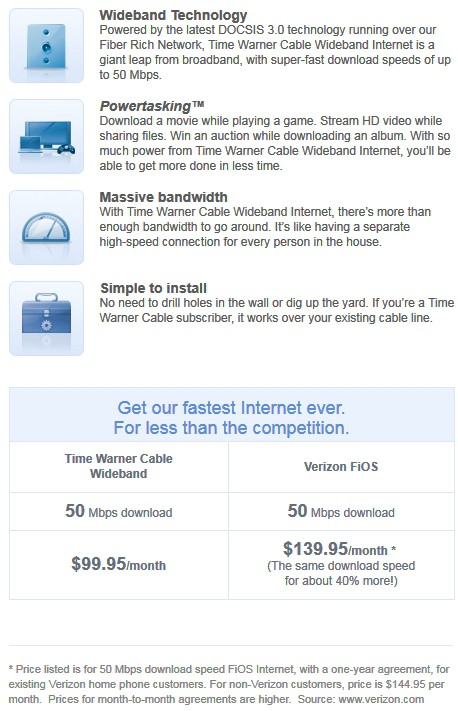With Time Warner Cable’s broadband now running as high as $50 a month for standard, stand-alone service, getting the best deal possible can save you as much as $20 a month off those prices. Time Warner Cable has been repricing their services to deliver the most value to customers who bundle all of the company’s products into a single package. But if you don’t want television or telephone service from the cable company, you are going to pay a lot more than your service-bundled-neighbors for Road Runner High Speed Internet.
Stop the Cap! presents our strategy to help broadband-only customers get the best possible prices from Time Warner Cable:
Choose Earthlink
Customers paying Time Warner Cable’s regular prices for broadband service are paying too much. Time Warner currently charges just short of $50 a month for Standard 10/1Mbps service (speeds are slower in some areas). That’s up from years of charging $40 a month, slightly higher if you were a broadband-only customer. But with the help of Earthlink, you can cut that broadband bill to $29.99 a month for the first six months. Earthlink co-exists with Road Runner, Time Warner Cable’s own broadband service. With just a few mouse clicks and a quick phone call, Time Warner can switch your regular price Road Runner to Earthlink without any equipment changes. Billing and service will continue to be provided by Time Warner and the change literally takes less than five minutes by phone.
Earthlink’s broadband service is indistinguishable from Road Runner — same speeds, same level of service, with two exceptions:
- Earthlink does not benefit from PowerBoost, which delivers temporary speed increases during file downloads
- You will forfeit your rr.com e-mail address
We recommend you avoid using ISP-provided e-mail addresses when possible, because they help tie you down to an existing provider. Instead, sign up for a free e-mail account from Google’s Gmail, or Yahoo! Mail, or any of the dozens of other web-based e-mail providers. Or, purchase your own domain name from GoDaddy or 1and1, which includes e-mail, and either read it on those sites or forward it to a web-based e-mail provider. Domain names can be had for under $10 a year and deliver maximum flexibility for those who want the freedom to change Internet providers.
After Six Months, Switch Back to Road Runner
When your Earthlink promotion expires at the end of six months, your price will increase to $41.95 per month. Just before that happens, switch back to Time Warner Cable’s Road Runner service. You qualify for new customer pricing promotions. As of this week, Time Warner Cable in western New York is offering one year at $29.99 per month for 10/1Mbps service. Other areas may have different pricing promotions.
After the year is up, you can start all over again, heading back to Earthlink for another six month promotional term. Earthlink has offered its promotional plan for more than two years, and it shows no signs of ending anytime soon.
Promotional Half-Truths
Promotions come and go from Time Warner Cable, so it is wise to check with them often if the $29.99 deal is not currently running in your area. Start by checking Time Warner Cable’s website, and remember if you are using Earthlink, you will want to select pricing for new customers. If you find a good price on the website, you may be able to complete your order online. Otherwise, call your local office and ask about currently running promotions. Some common ones:
- Road Runner Turbo at 50% off for the first year;
- Road Runner Turbo free for six months;
- Road Runner with wireless router/modem free for six months to one year;
- Road Runner with free installation (especially useful if you want Road Runner Extreme/Wideband service, which carries a pricey installation fee);
- Road Runner for $29.99 for six months;
- Bundled promotions — $99 for all three services, $79 for broadband/cable or broadband/phone
Not every promotion delivers the best deal for customers, and some have been slightly deceptive, such as this speed comparison we found on the cable company’s website this morning:
Our View:
- Time Warner Cable has been spanked before for their claims about running a “fiber network.” In fact, their “Fiber Rich Network” is a marketing stretch. All modern cable systems use fiber optics to help distribute their service into various communities, but coaxial copper cable delivers the signal through neighborhoods to your individual home. Cable companies still cannot match the broadband speeds available on an all-fiber network.
- “Powertasking” is a meaningless marketing claim. Any high speed network will allow the entire family to effectively share a broadband connection.
- We’re glad to know Time Warner Cable has “massive bandwidth” — more than enough to go around. We’ll remember that if and when the company ever entertains bringing back their experimental Internet Overcharging scheme they claimed was necessary to pay for equipment upgrades to cope with broadband traffic growth.
- It would be simpler to install Time Warner’s DOCSIS 3 upgrade if we could do it ourselves, but the cable company currently requires a mandatory service call ($67.98 fee) to install it.
- Time Warner is being cute comparing their broadband speed with Verizon FiOS. In fact, FiOS is faster because of what isn’t mentioned here — upstream speeds. Time Warner tops out at 5Mbps, Verizon offers 20Mbps for uploads. But Time Warner’s pricing is better at that download speed. Verizon is more aggressively priced when they bundle services together. For example, Time Warner’s $99 triple play bundle only offers 10/1Mbps service. Verizon offers up to 25/25Mbps service for the same price. Both include phone and television service.


 Subscribe
Subscribe












